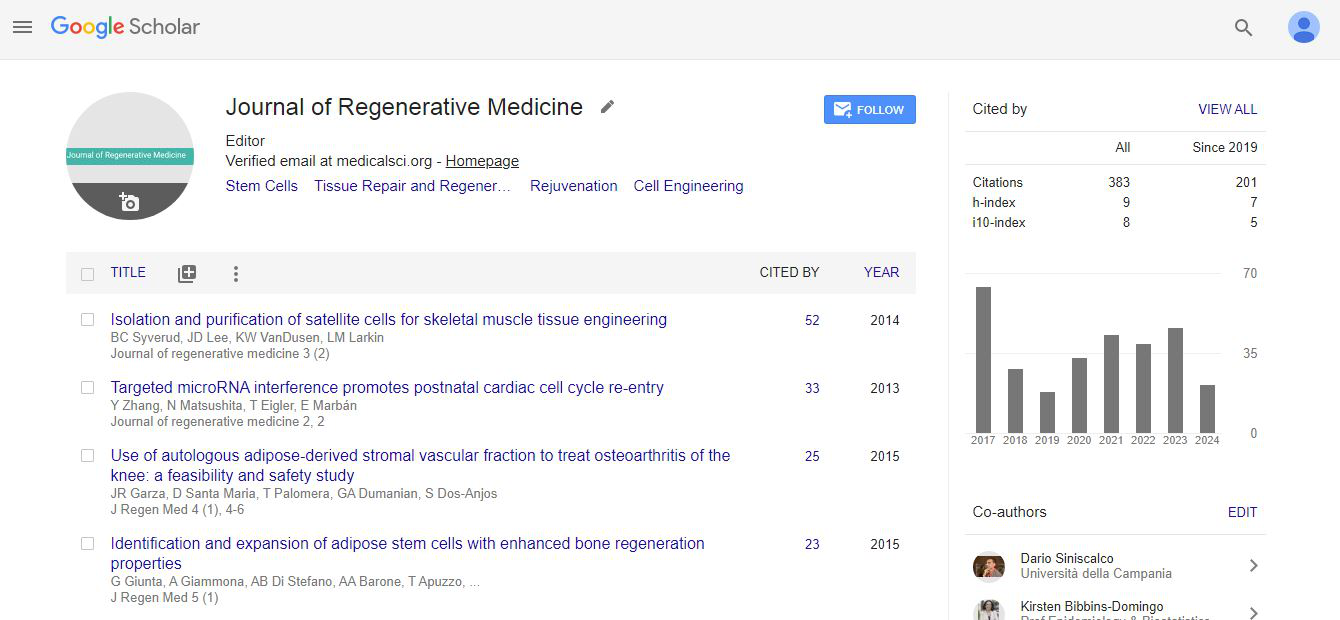Opinion Article, J Regen Med Vol: 12 Issue: 3
Induced Pluripotent Stem (iPS) Cells: Unlocking the Potential of Personalized Medicine
Robey Canalis*
Department of Obstetrics and Gynecology, Ein Kerem, Hadassah Hebrew University Medical Center, Jerusalem, Israel
*Corresponding Author: Robey Canalis
Department of Obstetrics and Gynecology, Ein Kerem, Hadassah Hebrew University Medical Center, Jerusalem, Israel
E-mail: canalisR21@hadassah.org.il
Received: 11-April-2023, Manuscript No. JRGM-23-106710;
Editor assigned: 13-April-2023, PreQC No. JRGM-23-106710 (PQ);
Reviewed: 27-April-2023, QC No. JRGM-23-87533;
Revised: 02-May-2023, Manuscript No. JRGM-23-106710 (R);
Published: 08-May-2023, DOI:10.4172/2325-9620.1000245
Citation: Canalis R (2023) Induced Pluripotent Stem (iPS) Cells: Unlocking the Potential of Personalized Medicine. J Regen Med 12:3
Copyright: © 2023 Canalis R. This is an open-access article distributed under the terms of the Creative Commons Attribution License, which permits unrestricted use, distribution and reproduction in any medium, provided the original author and source are credited.
Introduction
Stem cells hold tremendous promise in regenerative medicine, offering the potential to repair and replace damaged tissues and organs. Among the various types of stem cells, induced pluripotent stem (iPS) cells stand out as a revolutionary scientific breakthrough. These cells possess the remarkable ability to differentiate into different cell types, similar to embryonic stem cells, but without the ethical concerns. In this article, we explore the concept of induced pluripotent stem cells, their generation, applications, and the transformative impact they have on personalized medicine [1].
Understanding induced pluripotent stem (iPS) cells
Induced pluripotent stem cells are artificially reprogrammed adult cells that have been transformed into a pluripotent state. Pluripotent cells have the ability to differentiate into any cell type in the body, making them a versatile tool for studying disease mechanisms, drug discovery, and potential cell-based therapies.
Generation of iPS cells
The breakthrough discovery of iPS cells came in 2006 when scientists Shinya Yamanaka and Kazutoshi Takahashi successfully reprogrammed adult cells into pluripotent stem cells. This pioneering work earned them the Nobel Prize in Physiology or Medicine in 2012. The generation of iPS cells involves introducing a set of specific genes, known as pluripotency factors, into adult cells. These factors reprogram the cells, resetting their developmental clock and allowing them to regain pluripotency [2].
Applications of iPS cells
Disease modeling: iPS cells provide a valuable platform for studying human diseases in a controlled laboratory setting. By reprogramming cells from patients with genetic disorders or complex diseases, scientists can generate disease-specific iPS cell lines. These cells can then be differentiated into specific cell types affected by the disease, allowing researchers to study disease mechanisms, identify therapeutic targets, and test potential treatments.
Drug discovery and toxicity testing: iPS cells enable researchers to generate patient-specific cells for drug testing and toxicity screening. By differentiating iPS cells into relevant cell types, such as cardiomyocytes or hepatocytes, researchers can assess drug efficacy and potential side effects. This personalized approach to drug discovery holds promise for developing safer and more effective medications [3].
Cell replacement therapy: iPS cells have the potential to revolutionize cell-based therapies. By differentiating iPS cells into specific cell types, such as neurons, pancreatic beta cells, or cardiac cells, researchers aim to replace damaged or dysfunctional cells in various diseases. These personalized cell therapies hold promise for treating conditions such as Parkinson’s disease, diabetes, and heart disease.
Disease mechanism studies: iPS cells allow scientists to investigate the underlying mechanisms of diseases by recreating disease conditions in a laboratory setting. By differentiating iPS cells into affected cell types, researchers can observe disease progression, study genetic and environmental factors, and develop a deeper understanding of complex diseases [4].
Challenges and future directions
While iPS cells hold immense promise, challenges remain on the path to clinical translation:
Safety and quality control: Ensuring the safety and quality of iPS cells and their derivatives is critical. Rigorous protocols for reprogramming, differentiation, and characterization are essential to minimize the risk of tumorigenicity, genetic abnormalities, and immune rejection.
Standardization and scalability: Developing standardized protocols and scalable methods for generating and differentiating iPS cells is crucial for their widespread use in research and clinical applications.
Ethical considerations: Although iPS cells do not face the ethical concerns associated with embryonic stem cells, ethical considerations surrounding their use, including informed consent and privacy of donors, remain important.
Translational challenges: The transition from the laboratory to clinical applications requires further research and regulatory approvals. Optimizing differentiation protocols, developing delivery methods, and ensuring long-term safety and efficacy are key challenges [5].
Conclusion
Induced pluripotent stem cells have transformed the landscape of regenerative medicine, providing a versatile and ethically acceptable source of patient-specific cells for research and therapeutic purposes. The ability to generate disease-specific iPS cells and study human diseases in a controlled environment holds tremendous potential for understanding disease mechanisms, drug discovery, and personalized cell-based therapies. As research continues and technical challenges are addressed, iPS cells are poised to revolutionize personalized medicine, offering new avenues for treating complex diseases and advancing the field of regenerative medicine.
 Spanish
Spanish  Chinese
Chinese  Russian
Russian  German
German  French
French  Japanese
Japanese  Portuguese
Portuguese  Hindi
Hindi 